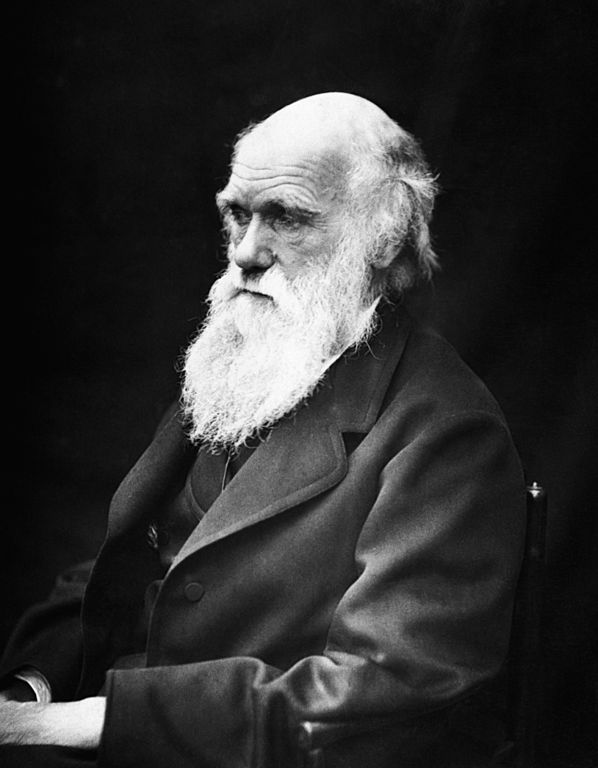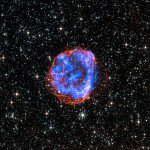
Charles Darwin (1809-1882) in 1869. Photograph by J. Cameron [public domain / Wikimedia Commons]
***
(8-19-09)
***
Catholic dogma on creation states only two things: Whatever exists came into being because of God’s creative and providential action; and Adam and Eve were real people, the sole progenitors of the human race. How God created and formed the universe in its present form, or whether some sort of evolution of species took place under the guidance of his providence is for science to discover. So far, all we have is theories, so the divine revelation that has come down to us is all we know for sure. You can therefore believe what you will concerning the scientific part.
Whether we were created from dust and dirt and clay in one second or created from dust and dirt and clay via other living creatures over millions of years seems to be no different in terms of what is more “objectionable” — going into any sort of scientific inquiry. I think we need to make sure our opposition isn’t merely emotional. Who’s to say God couldn’t have done it over millions of years?
I think our real battle with regard to science is with scientific materialists, who think there is no God and that science can explain everything whatsoever. That is the bottom line. The materialist view cannot be squared with a Christian view, but an evolutionary view easily can. It’s a matter of determining what science has demonstrated or not.
And I write, by the way, as one who is an agnostic on the whole question. I’m far more concerned, as an apologist, with atheism.
I am wanting to become Catholic, unfortunately I have come upon a huge road block for me. As a creationist I was happily going to join the church, assuming like some other evangelical churches, that the Catholic Church taught Genesis as historically accurate. I recently found out that the Church allows evolution. Evolution was Darwin’s way to support his atheist views, and to discredit God’s wonderful work of creation. Evolution mocks God and his existence. Its like an artist who painted a picture and told us how he painted it. To then come along and say “I don’t agree with how you say it happened. You were just writing a poem, and I think the painting formed and changed over the billions of years.” It also mocks us as being made in His image. Did He evolve too? I was so excited to be Catholic, and though it was really hard to understand some teachings, I was able to embrace them. I told people I was becoming Catholic, even in the face being of ridiculed, mocked, etc. My heart is deeply saddened. I know the Church is seeking the truth. They have made Mary’s Assumption dogma, and I am fine with that. Why can’t they make creation dogma for Elohim who made the heavens and the earth, the animals, and lastly man in His Image? It is mockery of God to deny His majestic work of creation. Now to make things worse, my husband and my children are all excited about becoming Catholic, and I can no longer do so (until I can reconcile these opposing viewpoints). I wish the pope would just state that the Bible is true, that God created the heavens and the earth, and man did not evolve because God made Him in his image. How can one even call themselves a Christian, and deny the creation account? I am deeply saddened. I love the Catholic church, but I can’t join and lie by saying I agree with everything they teach.
I understand that some Protestants and Catholics embrace theistic evolution. I don’t know if I could join a church that denied the creation account laid forth in Genesis. Please enlighten me on what exactly does the Church teach on creation. Since the Church only teaches ex cathedra on faith and morals, is it possible they could err in their teaching on science? Saying both sides believe in theistic evolution, doesn’t help explain what the Church teaches. I am wanting to join the Catholic Church but have this stumbling block in my way.
The Church has not denied the notion of God as Creator at all. It is Catholic dogma.
How He created is a different matter. Our true enemies are those who deny that God created and that He is involved in the natural world at all (or those who deny that He exists at all), not those who believe that He used evolution as the means to create.
The Church teaches that God created, that there was a primal human pair, Adam and Eve, and that they fell, and the human race fell in and with them. If that is denied, original sin would go with it. Theological liberals believe that, but not the Catholic Church. We teach that the fall was real and literal. We are also required to believe that God creates a human soul at conception: an act of special creation that cannot be measured by science, since it is not dealing with matter.
The Catechism of the Catholic Church treats the question of creation extensively (#279-314).
Anyone is perfectly free to believe in creationism and be a Catholic. No one is required to believe in evolution. All of that involves scientific questions beyond the purview of the Church (dogmas have to do with faith and morals).
I reiterate in the strongest terms that our true enemy is the materialistic atheist view. Evolution is not synonymous with that. We need to get beyond the merely emotional reaction against evolution. Argue against it from science (I do myself, by citing Intelligent Design), but not strictly an emotional plane. This need not be any stumbling block to being a Catholic. It’s not a question of denying the Genesis accounts, but of how to properly interpret them. The language has a latitude that doesn’t require, e.g., believing that “day” (Hebrew, yom) has to mean 24 hours. It does not. We need to watch that we are not importing Protestant fundamentalist dogmas into Catholicism.
* * * * *
- He who believes in separate and innumerable acts of creation may say, that in these cases it has pleased the Creator to cause a being of one type to take the place of one belonging to another type; . . .
- Have we any right to assume that the Creator works by intellectual powers like those of man?
- . . . may we not believe that a living optical instrument might thus be formed as superior to one of glass, as the works of the Creator are to those of man?
- Authors of the highest eminence seem to be fully satisfied with the view that each species has been independently created. To my mind it accords better with what we know of the laws impressed on matter by the Creator, that the production and extinction of the past and present inhabitants of the world should have been due to secondary causes, like those determining the birth and death of the individual.
- There is grandeur in this view of life, with its several powers, having been originally breathed by the Creator into a few forms or into one; and that, whilst this planet has gone cycling on according to the fixed law of gravity, from so simple a beginning endless forms most beautiful and most wonderful have been, and are being evolved.
- On the Origin of Species reflects theological views. Though he thought of religion as a tribal survival strategy, Darwin still believed that God was the ultimate lawgiver, and later recollected that at the time he was convinced of the existence of God as a First Cause and deserved to be called a theist. This view subsequently fluctuated, and he continued to explore conscientious doubts, without forming fixed opinions on certain religious matters. . . . Though reticent about his religious views, in 1879 he responded that he had never been an atheist in the sense of denying the existence of a God, and that generally “an Agnostic would be the more correct description of my state of mind.” . . .
- There was close correspondence between Darwin and his American collaborator Asa Gray, a devout Presbyterian who discussed with him the relationship of natural selection to natural theology and published several reviews arguing in detail that they were fully compatible. Darwin financed a pamphlet publishing a collection of these reviews for distribution in Britain. In one 1860 letter to Gray, Darwin expressed his doubts about the teleological argument which claimed nature as evidence of god, though he was still inclined to vaguely believe in an impersonal God as first cause:
With respect to the theological view of the question; this is always painful to me. I am bewildered. I had no intention to write atheistically. But I own that I cannot see, as plainly as others do, & as I (should) wish to do, evidence of design & beneficence on all sides of us. There seems to me too much misery in the world. I cannot persuade myself that a beneficent & omnipotent God would have designedly created the Ichneumonidæ with the express intention of their feeding within the living bodies of caterpillars, or that a cat should play with mice. Not believing this, I see no necessity in the belief that the eye was expressly designed. On the other hand I cannot anyhow be contented to view this wonderful universe & especially the nature of man, & to conclude that everything is the result of brute force. I am inclined to look at everything as resulting from designed laws, with the details, whether good or bad, left to the working out of what we may call chance. Not that this notion at all satisfies me. I feel most deeply that the whole subject is too profound for the human intellect. A dog might as well speculate on the mind of Newton. Let each man hope & believe what he can.
- In his autobiography written in 1876 he recalled that at the time of writing the On the Origin of Species the conclusion was strong in his mind of the existence of God due to “the extreme difficulty or rather impossibility of conceiving this immense and wonderful universe, including man with his capacity of looking far backwards and far into futurity, as the result of blind chance or necessity. When thus reflecting I feel compelled to look to a First Cause having an intelligent mind in some degree analogous to that of man; and I deserve to be called a Theist.” . . .
- In a letter to a correspondent at the University of Utrecht in 1873, Darwin expressed agnosticism:
I may say that the impossibility of conceiving that this grand and wondrous universe, with our conscious selves, arose through chance, seems to me the chief argument for the existence of God; but whether this is an argument of real value, I have never been able to decide. I am aware that if we admit a first cause, the mind still craves to know whence it came from and how it arose. Nor can I overlook the difficulty from the immense amount of suffering through the world. I am, also, induced to defer to a certain extent to the judgment of many able men who have fully believed in God; but here again I see how poor an argument this is. The safest conclusion seems to me to be that the whole subject is beyond the scope of man’s intellect; but man can do his duty. . . .
- In November 1878 when George Romanes presented his new book refuting theism, “A Candid Examination of Theism” by “Physicus”, Darwin read it with “very great interest”, but was unconvinced, pointing out that its arguments did not rule out God creating matter and energy at the beginning of the universe, with a propensity to evolve. If theism were true, “reason might not be the only instrument for ascertaining its truth”.
- In 1879 a letter came asking if he believed in God, and if theism and evolution were compatible. He replied that a man “can be an ardent Theist and an evolutionist”, citing Charles Kingsley and Asa Gray as examples, and for himself, he had “never been an Atheist in the sense of denying the existence of a God”. He added that “I think that generally (and more and more as I grow older), but not always, that an Agnostic would be a more correct description of my state of mind.”
- Those opposing religion often took Darwin as their inspiration and expected his support for their cause, a role he firmly refused.
So sure, the record is quite mixed and ambiguous, but it seems clear at least that Darwin was not a flaming atheist. He was inclined to a vague theism (certainly not trinitarian Christianity) but was ultimately agnostic as to the absolute proof of the existence of God. That’s still quite different from a hostile atheist position, though it is quite arguable that he was inclined in that direction, especially in later years. As usual, the truth is far more interesting and stranger than the myths that surround influential figures like Darwin.
*****
Pope Pius XII stated this; it isn’t just my opinion:
37. When, however, there is question of another conjectural opinion, namely polygenism, the children of the Church by no means enjoy such liberty. For the faithful cannot embrace that opinion which maintains either that after Adam there existed on this earth true men who did not take their origin through natural generation from him as from the first parent of all or that Adam represents a certain number of first parents. Now it is in no way apparent how such an opinion can be reconciled with that which the sources of revealed truth and the documents of the Teaching Authority of the Church propose with regard to original sin, which proceeds from a sin actually committed by an individual Adam and which through generation is passed on to all and is in everyone as his own. (Humani Generis, 1950)
19. Although these things seem well said, still they are not free from error. It is true that Popes generally leave theologians free in those matters which are disputed in various ways by men of very high authority in this field; but history teaches that many matters that formerly were open to discussion, no longer now admit of discussion.20. Nor must it be thought that what is expounded in Encyclical Letters does not of itself demand consent, since in writing such Letters the Popes do not exercise the supreme power of their Teaching Authority. For these matters are taught with the ordinary teaching authority, of which it is true to say: “He who heareth you, heareth me”;[3] and generally what is expounded and inculcated in Encyclical Letters already for other reasons appertains to Catholic doctrine. But if the Supreme Pontiffs in their official documents purposely pass judgment on a matter up to that time under dispute, it is obvious that that matter, according to the mind and will of the same Pontiffs, cannot be any longer considered a question open to discussion among theologians.












